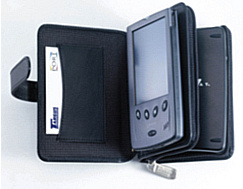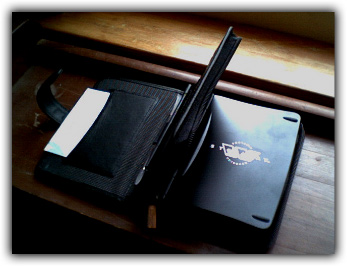
Since it is a Universal case, the first thing you will notice in the PDA section
is that there is a security rail so that you can insert a Palm Pilot. Unfortunately
or fortunately (depending on your view), due to the design of the Visor's stylus
"bay" you cannot use the security rail. Instead there is a Velcro
bed stitched into the PDA case that the Visor must lay on. Now personally I
have never been a big fan of augmenting my Visor with Velcro, but for the sake
of providing everyone with a complete review, I did. Guess what, who cares?
It really isn't that big of a deal and it doesn't have any effect on me using
any other case or module. It also means you can use this case with any Visor
model out there (including the Edge) or share it with another PDA device. Targus
was very smart by putting the "hook" part of the Velcro into the case,
so that when you put the sticky "eye" Velcro patches on your Visor,
it won't catch on anything else (other than Velcro) and it isn't a discomfort
while sitting in your palm. One item I actually liked about Velcro is that,
unlike some leather cases, you can yank your Visor out of this case instantly.
Then I thought "how safe is Velcro when holding the weight of the PDA
in place?" So in a very scientific test I took my Visor and case up onto
the bed and with the cover open I shook it. And I shook it. And I shook it.
Side to side, up and down, back and forth. It came off (53 arm numbing shakes
later). So it passed safety test #1 with flying colors. However, in my scientific
calculations I forgot to consider that anything hard you throw onto a bed, will
bounce. It bounced off the bed and I gasped as it arced towards the floor, and
landed safely onto the dog. Good doggy! One small note, you will need to cut
your Velcro strips in half before attaching them to the Visor. Due to their
size, they will interfere with the locking mechanism of the Hot-Sync cradle.
Not a big deal, if you remember to do it before you stick them.
Once affixed to the case you will find a pocket to stick a few business cards.
There is also a nice elastic stylus holder which expands to accompany almost
any stylus you would want to carry. It is so much easier to use that I decided
to keep a stylus in my Visor and keep a second in this case. Due to the width
and depth of the case with the keyboard inside, you will find it uncomfortable
to use your Visor while in the case, at first. After awhile it really is not
that difficult even if you have small hands. Without cutting it open, I would
have to guess that Targus used a piece of plastic in the lining of the case.
It is quite durable and I find it impressive that unlike many manufacturers
that cut corners, they didn't use cardboard. I was able to bend it and re-bend
it and it held it's shape. The cover is thin, but the use of the plastic lining
means that you won't be pushing any buttons from the outside by accident.
The biggest thrill for me is that the PDA section has an "open" design.
When the cover is closed, it covers the Visor by at least half an inch on three
sides. It does a respectable job of protecting against the elements, and it
allows you to use and carry many of your Visor modules while plugged in. However,
any module that adds to the actual depth of the Visor will prevent the Velcro
on the Visor from coming into contact with the case. This would have an effect
on the Edge, since to use a module you have to add the detachable Spingboard
slot. So, you could use this case with the Edge, but you would have to remove
it to use any module.
I only have one fault with the PDA section and that may just be a preference
issue. To close the PDA cover and fasten it, there is a leather strap that folds
around to the back of the case and slips into a loop. It takes a little more
time to fasten or undo the cover because the fit is very tight. I guess Targus
could have used a leather strap with Velcro, but I also believe that would cheapen
the look of the case. So all-in-all I can't really fault the design.
Holding the Stowaway >>